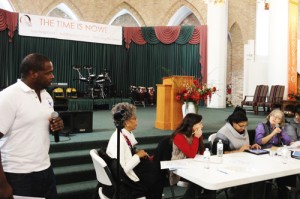By Jeremy Peters

The Chicago Educational Facilities Task Force (CEFTF) held their second meeting of 2013 on Saturday, February 9, 2013, from 10 am -12 noon at the Chicago Embassy Church on 5848 S. Princeton in the Englewood community. Once again, no representative from the Chicago Public Schools showed up.
Some at the meeting speculated that perhaps CPS officials were too busy trying to contain public outrage against the coming wave of school closures at the Rock Island Community Engagement hearing, which was scheduled at the same time. Had they cared enough to show up, they might have been able to make note of all the ways that CPS has been derelict in its obligation to support our neighborhood public schools. Prior to the appointment of Barbara Byrd-Bennett as “Chief Executive Officer” of Chicago Public Schools, the CPS representative on the Task Force had regularly attended.
The nine-member panel that represented the task force consisted of State Representatives Esther Golar and Cynthia Soto, along with representatives from the Chicago Coalition for the Homeless, the Chicago Principal and Administrators Association, the Chicago Teachers Union, and Blocks Together. There were close to a hundred people in attendance, of which close to sixty people signed up to testify about the conditions of their school facilities.
One person after another gave heart-wrenching accounts of strong community support for neighborhood schools that were showing real improvement despite real neglect of facilities by central office. Most of the common needs voiced by the endless parade of testimony included the need for air conditioning during the summer, adequate bathrooms, access to technology, adequate physical education facilities, and law-mandated space for students with special needs. All of the testimonies disputed the report of the recent “Commission on School Utilization.” The Commission had been appointed by Byrd-Bennett after she successfully lobbied the General Assembly to give her extra time to provide Chicago with a list of schools to be closed this year. The original deadline was December 1, but that was extended until March 31. A deadline of January 1 for a ten-year facilities plan was also extended for Byrd Bennett — to June 1.
Public testimony on February 9 challenged the Commission report’s findings on their neighborhood school, arguing that storage rooms, basements, and utility rooms were counted as instructional space, which affected their school’s utilization rating. They also complained of crowded special education classrooms, which were also overlooked by the utilization report.
The community testimonies were so detailed and impassioned that the panel had to group them by school to make the process more efficient. Even still, the number of testimonies ran so long that the two-hour hearing lasted three and half hours. Unlike the “hearings” being conducted by CPS in the Networks, officials did not cut off speakers or force them into focus groups, but listened and kept a record of every person who spoke.
Several conclusions became apparent by the end of this hearing.
First, CPS clearly does not care about working with communities to develop real neighborhood schools that strengthen the surrounding communities.
The second conclusion that became apparent is that CPS is apparently not making good on its promise to the State of Illinois to provide a comprehensive ten year facilities plan. No principals or Local School Council leaders that attended this meeting had ever received a survey that CPS had allegedly administered in November, and then again in January. This survey is being administered in order to gather input from neighborhood schools and their communities, and incorporated into the ten year facilities plan. Principals and LSC chairs have until February 28th to submit their survey of facilities needs at http:survey.constantcontact.com/survey/a07e6q9friaha9ynr1t/start .
Each school is entitled to only one survey. Therefore, only the first survey from each school will be accepted!
The third conclusion that became apparent is that the “second Saturday” monthly Facilities Taskforce hearings are the only real public forum that citizens in Chicago can actually be heard on issues affecting their public schools.
More community members, parents, teachers, and administrators need to attend these meetings. Invite your aldermen and use this forum as a space to push for a democratically elected school board.
The next meeting will be held Saturday March 9th, 2013 from 10am-12pm at Humboldt Park Library, 1605 N. Troy.
